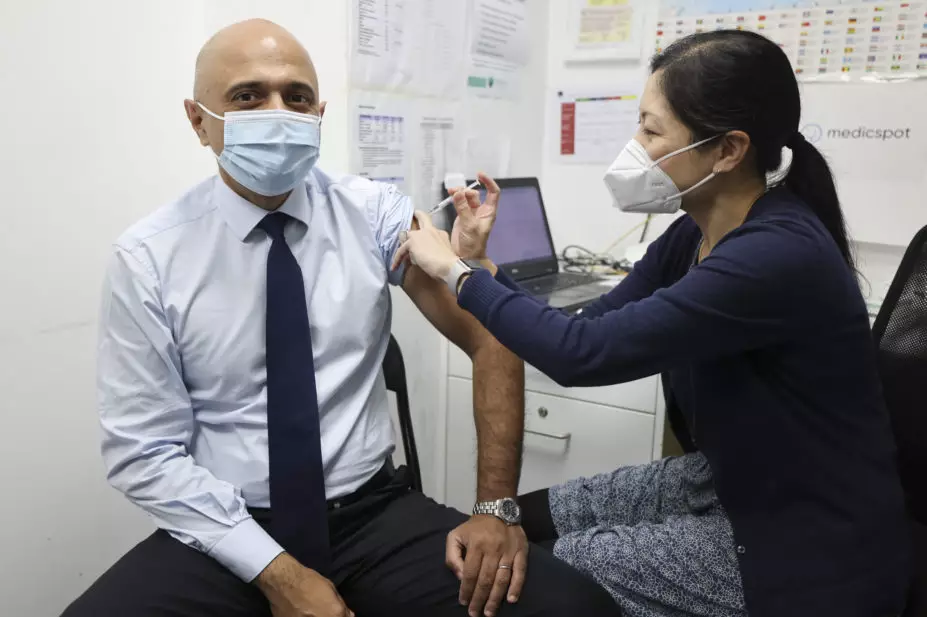
Tim Hammond / No 10 Downing Street
The health secretary has said he is looking into creating a national pharmacy minor ailments service in England, as part of a drive to take pressure off GP practices and bring back more face-to-face appointments.
Writing in the Daily Mail Online on 14 October 2021, Sajid Javid said he was “asking my department to work with the NHS and look at a ‘Pharmacy First’ scheme for England, so pharmacists can provide treatment for specific conditions such as sore throats, without patients having to go to their GP — building on pilot schemes in England … much as they already do in Scotland”.
Under the NHS Pharmacy First scheme, launched across Scotland in July 2020, community pharmacies can offer free advice, treatment and referrals to patients presenting with minor conditions and prescribe treatment for certain conditions. There were almost 500,000 consultations carried out under the service between January and March 2021.
The comments by Javid revisit a previous Labour government policy commitment in England, which announced that it wanted to see free pharmacy minor ailment services commissioned across the whole country in 2008.
However, this was never achieved and instead local commissioning groups began to decommission services to save money.
Data obtained by The Pharmaceutical Journal in December 2018 showed that a fifth of clinical commissioning groups (CCGs) had decommissioned these types of schemes between 2015 and 2018, and data published by NHS Digital in November 2019 showed that the number of community pharmacies offering minor ailment schemes had fallen by a third since 2017/2018.
Javid’s comments were published the same day as NHS England released ‘Our plan for improving access for patients and supporting general practice‘. Under this latest plan, a £250m winter access fund will be set aside from November 2021 to March 2022, to increase access to face-to-face and same-day GP appointments.
Commenting on the fund, Javid said the cash would be an “investment in general practice to boost capacity ahead of the winter, opening up more appointments”.
The plan says that all GP practices will be encouraged to sign up to refer patients via the community pharmacist consultation service (CPCS) by 1 December 2021 and there will be new incentives for GPs to refer patients to the scheme to “help alleviate pressure on GP appointments by harnessing the skills and knowledge of community pharmacists”.
Some 800 GP practices are signed up to CPCS currently, which provides advice in community pharmacy for patients with minor ailments, but patients have to be referred and free treatment or prescriptions are not provided.
Alastair Buxton, director of NHS Services at the Pharmaceutical Services Negotiating Committee, said the body would “welcome the ambition for pharmacy teams to do more to provide access to medicines without the need for people to visit their GP and we look forward to exploring the details of this with [the Department of Health and Social Care]”.
Referring to the winter access fund, Buxton said that CCGs and integrated care systems should use this “to commission additional local services from community pharmacy, including services to augment the CPCS such as patient group directions”.
Thorrun Govind, chair of the English Pharmacy Board, welcomed the health secretary’s recognition of pharmacy teams’ importance to the future of the health service. “I’d now look to the government and NHS to work with professional bodies, patient groups and others across the health service on how we can build on this to include services such as supplying medicines without the need to visit a GP,” she said.
The Department of Health and Social Care did not comment in time for publication.
Box: Postcode lottery
Scotland
In Scotland, the NHS Pharmacy First scheme launched nationwide in July 2020. Under the scheme, community pharmacists can offer free advice, treatment and referrals directly to patients presenting with any minor health condition, and medicines from an approved list of products. Half a million consultations were carried out under service between January and March 2021. An extended version of the scheme, NHS Pharmacy First Plus, also provides an independent-prescriber led service for conditions that would otherwise have required referral, including urinary tract infections, allergies and dermatological conditions.
Wales
In Wales, the Choose Pharmacy Common Ailments Service provides free community pharmacy-based advice and free over-the-counter medicines directly to patients for 26 minor illnesses. In June 2020, NHS Wales also launched a pilot of the Independent Prescribers’ Service, which allows pharmacist independent prescribers to record clinical information and medicines prescribed during a ‘Choose Pharmacy’ consultation. As of June 2021, more than 2,500 consultations had been recorded on the system. Data published in June 2021 showed that pharmacist independent prescribers in Wales had delivered more than 16,000 consultations since 2016.
England
Under the Community Pharmacist Consultation Service, which launched in October 2019, NHS 111 and general practice can refer patients with minor illnesses to a community pharmacy for free advice or referral. However, any over-the-counter medication recommended must be paid for and prescribing services are not available. Data published in June 2021 showed that 353,000 patients had been referred to community pharmacies through the CPCS since the service began. Some community pharmacies in England provide an extended minor ailments service, funded by local commissioning groups, which can provide free over-the-counter medicines for minor conditions, such as colds, allergies and minor skin conditions, for patients who do not pay for prescriptions. However, many areas have decommissioned these schemes in recent years.


